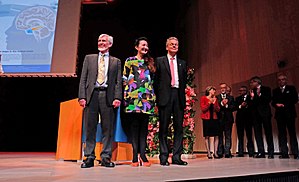Department of Psychology, NTNU
Institutt for psykologi | |
| Formation | 1967 |
|---|---|
| Type | Institute |
| Location | |
Key people | Edvard Moser and May-Britt Moser, Nobel laureates in Physiology or Medicine |
Parent organization | Norwegian University of Science and Technology |
Staff (2019) | 144 (120 additional scientists at the Moser research environment) |
| Website | www |
The Department of Psychology (Norwegian: Institutt for psykologi, formerly Psykologisk institutt) at the Norwegian University of Science and Technology (NTNU) is one of the largest research institutes and educational institutions in psychology in Norway. The department has 144 employees (2019) and 1,100 students.
The neuroscientists and later Nobel laureates Edvard Moser and May-Britt Moser joined the department on a full-time basis in 1996, where they established Moser research environment that includes an additional 120 full-time scientists as of 2019; it was one of the 13 inaugural research centres appointed as elite research environments by the Government of Norway in 2002 and is one of 19 Kavli Institutes worldwide. In 2012, the Norwegian Brain Lab, the world's largest neuroscience laboratory, was also established at NTNU, on the basis of the Moser group's activities. The Mosers received the 2014 Nobel Prize in Physiology or Medicine for their work at the institute in identifying the place cells that make up the brain's positioning system.
History[edit]
The institute was established in 1967, although it can trace its roots to 1946. In 1969 it became part of the University of Trondheim, a loose federation of university-level institutions in Trondheim. It was one of the university-level institutions in Trondheim that merged to form the consolidated Norwegian University of Science and Technology in 1996.[1]
The two Nobel laureates in medicine Edvard Moser and May-Britt Moser were appointed as associate professors of biological psychology at the institute in 1996 and later became full professors of neuroscience; they established their own neuroscience laboratory at the department, the Moser research environment with 120 scientists as of 2019.[2] The Moser group was awarded the status of "centre of excellence" by the Government of Norway in 2002, as one of the inaugural thirteen research centres appointed as elite research environments in all of Norway.[3] The Mosers received the 2014 Nobel Prize in Physiology or Medicine for their work at the institute and its offshoots in identifying the place cells that make up the brain's positioning system.[4][5][6] In 2012 the Norwegian Brain Centre, the world's largest neuroscience lab, was established at NTNU on the basis of the Moser group's activities.[7] Aiming to be a hub for brain research worldwide, it was opened by Prime Minister Jens Stoltenberg, who described the research environment as the world's leading in its field.[7][8][9][10]
The institute is increasingly collaborating with the Faculty of Medicine. The institute is scheduled to move to a new Centre for Mental Health at the NTNU and St. Olav's University Hospital campus at Øya in central Trondheim, which it will share with parts of the Faculty of Medicine.[11]
The institute conducts research in clinical psychology, neuroscience, personality psychology, forensic psychology and other areas of psychology. It offers PhD programmes in psychology as well as clinical professional and bachelor's and master's degrees in psychology. The institute includes several clinics; the organisation of the clinical education in psychology has been debated in the 2010s.[12][13]
Notable academics[edit]

- Bente Gunnveig Berg, Professor of Neuroscience
- Knut Hestad, Professor of Clinical Neuropsychology
- Odin Hjemdal, Professor of Clinical Psychology
- Leif Edward Ottesen Kennair, Professor of Personality Psychology
- Audrey van der Meer, Professor of Neuropsychology
- Edvard Moser, Professor of Neuroscience, 2014 Nobel laureate in Physiology or Medicine
- May-Britt Moser, Professor of Neuroscience, 2014 Nobel laureate in Physiology or Medicine
- Silje Steinsbekk, Professor of Clinical Psychology
- Ruud van der Weel, Professor of Cognitive Psychology
References[edit]
- ↑ Søvik, Nils, Pedagogisk institutt NTNU 1946–1996 [The Department of Psychology at NTNU 1946–1996], Tapir Akademisk Forlag, 2008, 342 pages, ISBN 9788251923637 Search this book on
 .
.
- ↑ "NTNU ber om 51 millioner i tilskudd til Moser-miljøet". Universitetsavisa.
- ↑ "NTNU-sentre vant forsker-millioner" [NTNU research centres receive millions], Adresseavisen, 12 June 2002
- ↑ "The Nobel Prize in Physiology or Medicine 2014". www.nobelprize.org. Retrieved 2017-02-07.
- ↑ Fenton, André A. (2015-06-01). "Coordinating with the "Inner GPS"". Hippocampus. 25 (6): 763–769. doi:10.1002/hipo.22451. ISSN 1098-1063. PMID 25800714.
- ↑ "Fra bomberom til nobelpris" [From air raid shelter to Nobel prize], forskning.no, 5 December 2014
- ↑ 7.0 7.1 "Åpnet verdens største hjernelab" [Opened the world's largest brain lab], Norwegian News Agency, 29 February 2012
- ↑ "– Vi ønsker å lage et hjernehus," Teknisk Ukeblad
- ↑ "– Det er ikke naturlig at vi er gode på hjernen – men vi er verdensledende, mener statsministeren, som i dag åpnet Norges nye hjerneforskningslaboratorium", Teknisk Ukeblad
- ↑ "Hjerneforskning i verdensklasse koster" [World-leading brain research is costly], Adresseavisen, 29 March 2012
- ↑ Endelig håp for psykiatrisenteret
- ↑ "Uro rundt rektors utredning av psykologklinikker på NTNU". Khrono. Oslo. 2019-06-28.
- ↑ "– Håper studentene våkner opp og ser hva som skjer". Psykologisk.no. Oslo. 2018-03-10.
External links[edit]
This article "Department of Psychology, NTNU" is from Wikipedia. The list of its authors can be seen in its historical and/or the page Edithistory:Department of Psychology, NTNU. Articles copied from Draft Namespace on Wikipedia could be seen on the Draft Namespace of Wikipedia and not main one.
